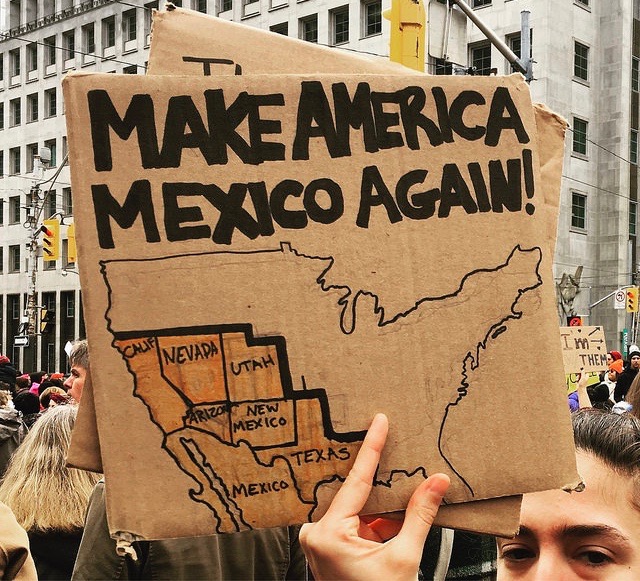For the last couple of days, the Mexican government been playing host to the redoubtable duo of Secretary of State Rex Tillerson and Homeland Security chief John Kelly. They have been, it will come as no surprise, trying to pour oil on the turbulent waters of the current relationship between the United States and Mexico.
There is simply not much to be hoped for from such efforts, given the quantity of bile vomited upon our neighbors to the south by Donald Trump during his campaign to be elected Beloved Leader. Their task was hardly facilitated by some typically untimely remarks from Mr Trump in which he reiterated one of his favorite lines about “bad hombres” (the sort of thing more appropriate to a trailer park barbeque than to the discourse of a US president). This would be more worrisome
This would be more worrisome in a more rational administration. For the Trumpites it is just another moment of the sort of guerilla theater that is public life these days.
One might, perhaps, take it as a sign that the dignity that has traditionally been associated with the office of President of the United States has diminished somewhat by the fact event most emblematic of affairs at 1600 Pennsylvania Avenue seems to be the Twitter spat. Indeed, Trump was still two weeks from being ensconced in the office when he was trolled by former Mexican president Vincente Fox Calderon.
The American people, or at least slightly less than 50% of the 55% who could be bothered to vote, seems to have expressed an interest in change irrespective of its actual content. What they got was an administration that seems to arrive at the White House every morning in a clown car.
To compare the current state of the highest echelons of government in the United States to years past is the sort of thing to inspire feelings of vertigo and raw nausea in anything person. Responding to Trump’s bizarre insistence that he would build a wall (simultaneously fabulously expensive and wholly pointless) along the border between the United States and Mexico, Vincente Fox directed a stream of caustic tweets at the then president-elect.
The most pointed of these read, “TRUMP, when will you understand that I am not paying for that fucken wall. Be clear with US taxpayers. They will pay for it.” One can hardly imagine such august personages as Franklin Delano Roosevelt, Ike Eisenhower, or John F. Kennedy being addressed in this way. But such is the tenor of things these days.
Perhaps almost as bizarre, given the historical relationship between the United States and the nations of Latin America, Vincente Fox also (in the same series of tweets) questioned Trump’s democratic legitimacy and was, it must be conceded, not obviously wrong. It seems that now (if you’ll pardon the mixed metaphor) the tin pot dictatorship is on the other foot.
One key feature of this new era of American politics is the willingness of many in this country to simply ignore Donald Trump’s deficits in terms of basic knowledge. It is not merely that he knowingly utters falsehoods. That is merely the coin of the political realm, even if Trump does spend it rather more freely than most of his predecessors. What is truly remarkable is his apparently invincible ignorance.
There is simply no excuse for any public figure, much less the leader of the (for the moment) free world to publicly misstate matters that could be nailed down by spending ten seconds on Google. Trump has certainly never read Marshall McLuhan. But one could hardly imagine a public figure for whom the message is so wholly subsumed in the medium. The mere tone of the assertion is sufficient to certify its truthiness.
Mr Trump’s agenda is, in many important respects, fluid, careening between what the market will bear and what the people will believe. His repeated assertions on the topic of the border wall have form part of a discursive project that extends far beyond the actual construction of any such barrier. The wall exists as an image, an element of a conceptual architecture untouched by the complexities of topography, the vicissitudes of international politics, the unwillingness of many in congress to shoot $22 billion (just for starters) down a rat hole, or the underlying fact that it is simply ludicrous.
Yet it is by the power of simple, manly assertion that President Trump’s ideas are both formulated and promulgated. Since the Mexican government has shown no enthusiasm for participation (or acquiescence) in one of the most gigantic boondoggles recorded in the history of guilty man, alternative strategies have been required. Perhaps, averred Trump and his proxies, a 20% tariff on goods coming in from Mexico would do the trick. It might if it weren’t for the fact that the importer pays the tariff, not vice versa. And even with the workaround that all the president’s men tried to concoct, it was (and is) clear that this amounts to a tax on Americans, not Mexicans.
Most recently, Stephen Miller, the embodied distillation of Steve Bannon’s id, betook himself to assert in public that the wall would pay for itself. Aside from the fact that this approach lacks the satisfying Schadenfreude of heaping misery upon a group (Mexican and Latino people in general) who the white nationalist right enjoys loathing, it also simply has no basis in economics, at least as it is understood on this side of the looking glass.
Simply put, things which generate no revenue do not pay for themselves. The wall costs money, both for construction and maintenance (and thus would put wages and other emoluments in some pockets) but it does not facilitate any continuing economic process, except for the disappearance of dollar bills into the ether, or into the bank accounts of Trump’s friends and enablers (which amounts to the same thing).
There is a rather bizarre learning process going on in which the representatives of the US government (who might be expected to know better), and Trump himself (who mightn’t) discover that, short of actual war, it is very difficult to compel one sovereign nation to bend to the will of another. As with the wall, this issue has likewise reared up with respect to Mr Trump’s plan to deport some 11 million undocumented people.
The Mexican government points out, and not without reason, that a large proportion of these people (just over 50% according to a Pew Research Center study) do not come from Mexico and, being effectively stateless, shouldn’t be made Mexico’s problem. In fact, the transfer of population between Mexico and the United States has in recent years begun to move in the opposite direction.
But these are mere facts, and if they do not comport with Donald Trump’s image of a country awash in criminally inclined immigrants, so much the worse for them.
Photograph courtesy of Francis Mariani. Published under a Creative Commons license.





